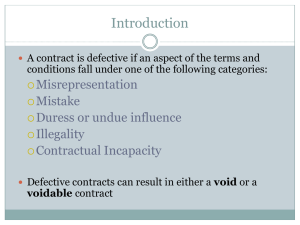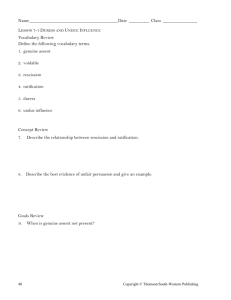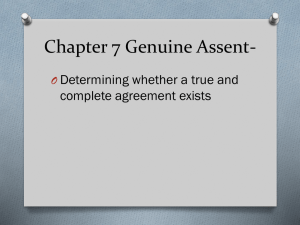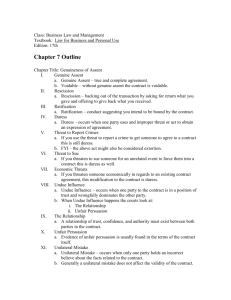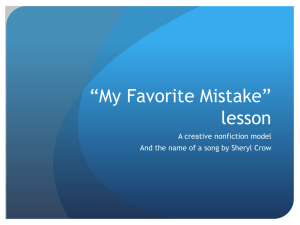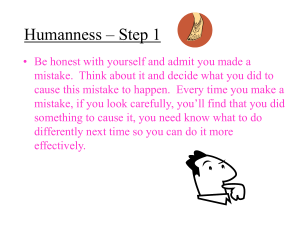6_-_defective_contracts-2
advertisement
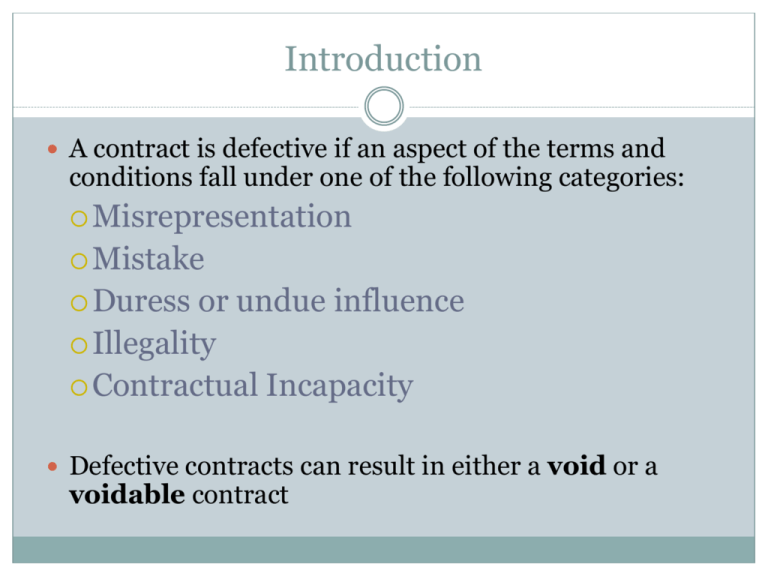
Introduction A contract is defective if an aspect of the terms and conditions fall under one of the following categories: Misrepresentation Mistake Duress or undue influence Illegality Contractual Incapacity Defective contracts can result in either a void or a voidable contract Misrepresentation Conduct which amounts to an active attempt at concealing a fact. Types: 1. Innocent 2. Negligent 3. Fraudulent Makes a contract voidable with recession as a remedy Walters v Morgan (1861) – Nod, wink, shake, smile Gordon v Selico (1986) - Homeowners covered up dryrot in the house. Compare: Horsfall v Thomas (1862) – The gun was not examined before the purchase. Opinion Bisset v Wilkinson (1927) – B purchased land to raise sheep. W said it would hold about 2000 sheep, but he had never raised sheep to know for sure. When B tried, it was not close to 2000. A person who gives an opinion about something will not be liable unless he had special skill to cause them to rely on that opinion – Esso v Mardon (1976) “This washing powder washes whiter than white.” Sales talk – Dimmock v Hallett (1866) Future Intention Edgington v Fitzmaurice (1885) – Company claimed that proceeds from the sale of debentures would go towards improving the business, but they knew the money was going to be used to pay off company debts Will not be misrepresentation as long as the intention was honest at that time, even if it changes. Change in circumstances: With v O’Flanagan [1936] Ch 575 Duty of Disclosure Caveat emptor (buyer beware) No general duty to disclose, so keeping silent is not misrepresentation. – Turner v Green (1895) Exception: Latent defects, which a buyer could not reasonably discover for himself by inspecting See: Sykes v Taylor-Rose [2004] EWCA 299 – Murder at house Partial Revelation Dimmock v Hallett (1866) LR 2 Ch App 21 Seller said the land was “fertile and improvable”, but approximately ¼ of the land was useless. Reliance Redgrave v Hurd (1881) – Offer to check books Doyle v Olby [1969] 2 QB 158 – No offer to check books Sabrina went to buy a perfume shop in Aboutique Mall from David for 50k. David said, “This store brings in about 75k business a month. You can check for yourself if you think I’m lying.” Sabrina, not wanting David to feel bad about her not believing his numbers, she said, “No I believe you.” and concluded the transaction. After the first month, Sabrina barely made 10k and sued David. The accounts clearly showed that the business was declining and if Sabrina had checked, she would have noticed that before buying the business. Is David liable for misrepresentation? Fraudulent Misrepresentation Once there is fraud, the fraudster will be liable for all loss, whether foreseeable or not Doyle v Olby (1969) Honest Mistake: Hedley Byrne v Heller (1963) Maker of careless, honest mistake may be liable if there is a special relationship Negligent Misrepresentation Only when there is a breach of a fiduciary duty* Usually dishonest statement, but now careless misstatement Hedley Byrne v Heller [1964] AC 465 *Fiduciary: An individual in whom another has placed the utmost trust and confidence Remedies Rescission enables both parties to be restored to the original positions. Will not be ordered by court where there is: 1. Affirmation – Long v Lloyd (1958): Accepted repairs, but more faults showed up 2. Lapse of time – Leaf v International Galleries (1950): Fake painting that was not noticed until 5 years later 3. Impossibility of restitution – Clarke v Dickson (1858): Bought shares right before the company was liquidated 4. Third party rights affected – Car v Caldwell (1965): Car was sold to a third party Mistake Jamille Broome Introduction • A contract is defective if an aspect of the terms and conditions fall under one of the following categories: • • • • • • Misrepresentation Mistake Duress or undue influence Illegality Contractual Incapacity Defective contracts can result in either a void or a voidable contract Mistakes An “erroneous belief” Categories : Common Mistake – The parties make the same mistake Mutual Mistake – The parties are mistaken about the same fact under different misapprehensions. “Offer and acceptance” mistake Raffles v Wichelhaus [1864] EWHC Exch J19 Unilateral Mistake – One party makes a mistake Hartog v. Collin [1939] 3 AER 566 Fundamental Common Mistakes Mistake to title – cannot buy something you already own: Cooper v Phibbs (1867) Subject Matter does not exist Couturier v Hastie [1856] UKHL J3 – C was shipping corn from Greece to UK and during the voyage, H agreed to buy it when it arrived. The corn decayed and H refused to pay. Mistake by Identity – Mistake of identity makes the contract void ab initio and therefore title was not passed to fraudster, so it cannot pass from fraudster to third party. Mistake by identity: third party rights Cundy v Lindsay (1877–78) LR 3 App Cas 459 – Man sent letter imitating a reputable company to buy goods from Lindsay. They knew the company well, so shipped goods. He then sold goods to Cundy. Lindsay never received payment. Compare to: Phillips v Brooks Ltd [1919] 2 KB 243 - Crook claimed to be Sir Xxx at a jewellery store. They checked the phone book to confirm his address and took £3000 cheque that bounced. He then pawned jewellery for £350. Jewellery store sued pawn shop Ingram v. Little [1961] 1 QB 31 – Cheque payment for car rejected by sisters until the man said who he was : Pearce LJ “... an individual of apparent standing and respectability”. Car later sold to Mr. Little Frustration Legal termination of a contract due to unforeseen circumstances that 1. Occurs after the contract has been formed; render its performance illegal 2. Is not due to the fault of either party; and a. e.g. Change in law or injury When a frustrating event occurs the contract is automatically discharged and the parties are excused from their future obligations. Frustration is not acceptable as an excuse where the circumstance was foreseeable, and is not applicable to certain types of contracts such as insurance policies. Impossibility of performance McRae v Commonwealth Disposals Commission [1951] HCA 79 Australian contract law case, relevant for English contract law Frustration not available when: An alternative method of performance is possible The contract is merely more expensive to perform The event is brought about through one of the parties' own conduct The parties have made express provision for the consequences of the particular event which has occurred Non Est Factum “That is not my deed” Can be relied upon if at the time of entering the contract, the person was: Tricked Disabled Not Careless Non Est Factum L’Estrange v Graucob [1934] Not reading fine print was not an excuse Saunders v Anglia Building Society [1970] 78 year-old lady was tricked into signing a document without reading because she had just broken a glasses


